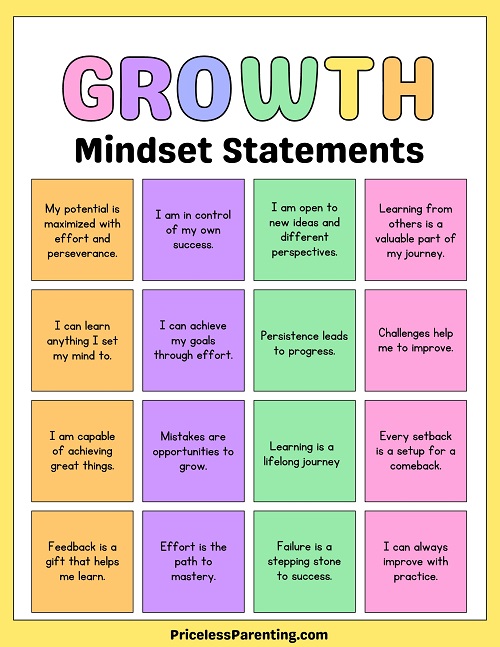Fostering School Success By Encouraging a Growth Mindset
by Kathy Slattengren, M. Ed., Priceless Parenting (sign up for monthly parenting newsletter and receive 20+ printable charts for kids and parents)

The concept of a growth mindset, popularized by psychologist Carol Dweck, has revolutionized the way educators and parents think about learning and intelligence. A growth mindset is the belief that abilities can be developed through dedication and hard work. This contrasts with a fixed mindset, the belief that intelligence is a static trait.
As a parent, you play a pivotal role in shaping your child's mindset and approach to learning. A growth mindset is a powerful concept that can set your child on a path of lifelong learning and success.
Embracing Growth Mindset Statements
The growth mindset chart above lists 16 statements that encourage this type of thinking. Statements like "I am in control of my own success." This powerful statement embodies the essence of a growth mindset. It emphasizes personal agency and the ability to shape one's own educational journey. When your children believe they are in control, they are more likely to take on challenges, learn from their mistakes, and persist through difficulties.
Another statement is "My potential is maximized with effort and perseverance." This sentiment aligns perfectly with the principles of a growth mindset. It acknowledges that while talent is a starting point, it is the effort and perseverance that will amplify one's abilities. By understanding that effort can lead to improvement and mastery, children are motivated to put in the necessary work to achieve their goals.
Linking these positive affirmations to school success is not just motivational; it's backed by research. Studies have shown that students who adopt a growth mindset are more resilient in the face of challenges and are better equipped to handle the pressures of academic life. They are more engaged in the learning process, which leads to higher achievement.
You may want to
print out a copy of this growth mindset chart and put it on the refrigerator or somewhere else where your kids will see it. They could also make their own chart using their own positive statements.
Strategies for Encouraging a Growth Mindset
So, how can you help your children develop a growth mindset? Here are nine strategies for encouraging a growth mindset:
- Praise Effort, Not Just Achievement: Recognize the hard work your child puts into their tasks, not just the end result. This reinforces the value of persistence and effort over innate ability or intelligence.
- Encourage Problem-Solving: When your child encounters a difficulty, resist the urge to jump in and fix it. Instead, encourage them to come up with solutions. Ask questions like, "What's another way you could approach this?"
- Embrace Challenges as Opportunities: Help your child see challenges as a chance to grow rather than something to avoid. Teach them that stepping out of their comfort zone is how they learn new skills.
- Normalize the Learning Process: Make it clear that learning is a journey, with its ups and downs. Share stories of successful people who have failed and persevered, highlighting that setbacks are a natural part of the process.
- Teach the Power of 'Yet': The word 'yet' can be incredibly powerful. If your child says, "I can't do this," add the word 'yet' to the end of the sentence. It transforms a statement of defeat into one of growth.
- Set Learning Goals: Work with your child to set specific, achievable learning goals. Celebrate the progress towards these goals, no matter how small, to show that growth is an ongoing process.
- Provide Constructive Feedback: Offer feedback that focuses on how they can improve. For example, instead of saying "This is wrong," you could say, "Let's look at this together and see how you can do it differently next time."
- Encourage Reflection: After an activity or project, ask your child what they learned and what they could do differently next time. This reflection helps them understand that learning is about continuous improvement.
- Cultivate a Love for Learning: Expose your child to a variety of topics and activities. Encourage their curiosity and interests, showing them that learning can be enjoyable and rewarding.
By incorporating these strategies into your daily interactions, you'll help your child develop a growth mindset that will serve them well throughout their education and beyond. Remember, the goal is to instill a love for learning and a belief in the power of perseverance and effort. With your support and guidance, your children will learn to embrace challenges, persist through obstacles, and enjoy the journey of learning.